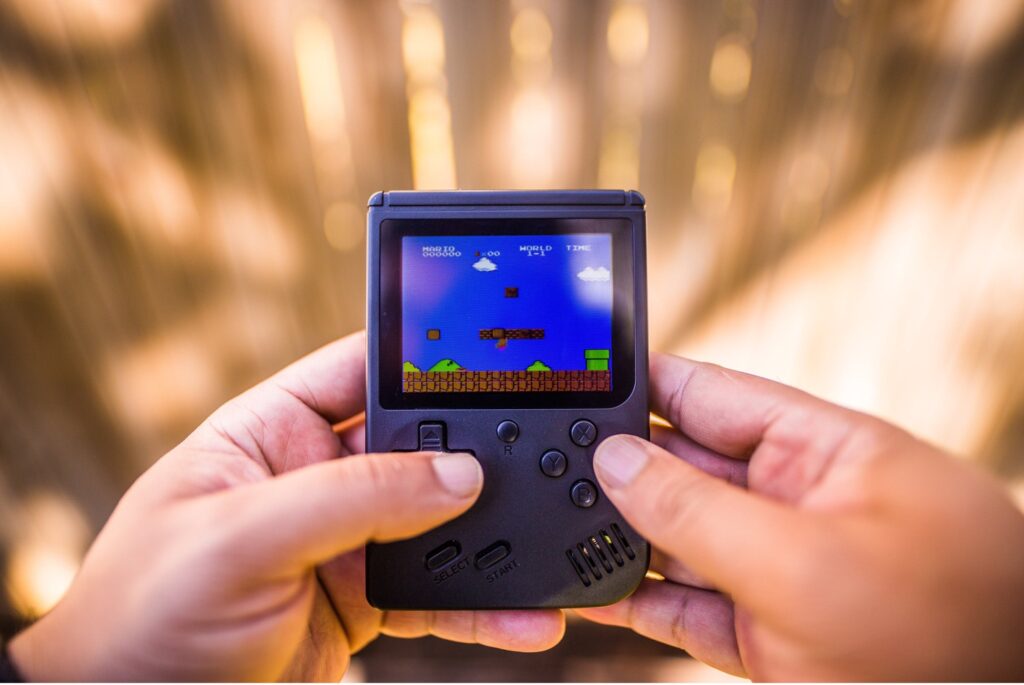
Source: Caleb Oquendo
The first video game was introduced in October 1958 by Physicist William Higinbotham. It was a basic tennis game that looked a lot like the 1970s hit Pong1. Decades afterwards, games like Mario, Animal Crossing, Fortnite, and many more highly complex releases are being introduced by the video game industry each year.
Video games open the possibility of embodying a virtual character, deciding their fate, interacting with other players, and customizing a world, among many other things. The modern video game requires a significant amount of attention, perceptual, and executive abilities, much more than video games of the past2. Video games are often geared towards children and adolescents. Spending countless hours on a game has significantly increased with the COVID-19 pandemic lock-in.
There are perennial debates about whether video games are harmful towards children and adolescents, or whether they benefit their cognitive development. Many past studies have sought to address this question. One study involved 14 professional video game players and 16 casual video game players, testing each player’s cognitive abilities: processing speed, attention, memory, dexterity, tracking, and executive functions2. The results indicated that professional players showcased a higher visual-spatial short-term memory, ability to track multiple objects, and visual attention. Though the selective sustained attention and auditory working memory decreased2. Another study examined 31 young adults and 31 older adults in a cognitive test with two different genres of video games (one action and one strategy game). For one and a half hours, the participants played the game while taking a DTI scan (diffusion tensor imaging tractography), an MRI technique that conducts brain imaging of the participant. The study found white matter in the right fornix region was correlated with the action game, while the white matter in the left hippocampus region was correlated with the strategy game3. Better performance on tasks with working memory and perceptual discrimination correspond to enhancing learning in both games3.
In addition to these cross-sectional studies – observing multiple individuals at a single point in time – longitudinal studies that track individual participants over longer periods of time indicate that video games can influence long-term cognitive development. One study recruited 298 children and their parents to examine psycho-social health in children. First, the parents were contacted with a letter and a phone interview to get a baseline view of their child’s behavior4. As their children spent more time playing video games, hours spent gaming each week generally increased. Interestingly, violent video games in the study didn’t show any significant association with aggressive behavior or discouraging prosocial behavior (Though the parents did report children playing more violent video games after 1 year of playing). Rather, frequent competitive gaming with children playing 8 hours or more per week correlated with decreasing prosocial behavior4.
Video games in general may not be a concern for parents – but factors like the amount of screen time and the type of games played can contribute to problems for children and adolescents. With video games increasing in popularity, children and adolescents are exposed to games providing a quick dopamine hit and lots of entertainment. The frequency of video game play seems to be a controlling factor for how the child will behave.
References
- October 1958: Physicist Invents First Video Game. http://www.aps.org/publications/apsnews/200810/physicshistory.cfm.
- Smirni, D., Garufo, E., Di Falco, L. & Lavanco, G. (2021). The Playing Brain. The Impact of Video Games on Cognition and Behavior in Pediatric Age at the Time of Lockdown: A Systematic Review. Pediatr. Rep. 13, 401–415
- Ray, N. R. et al. (2017). Evaluating the relationship between white matter integrity, cognition, and varieties of video game learning. Restor. Neurol. Neurosci. 35, 437–456.
- Lobel, A., Engels, R. C. M. E., Stone, L. L., Burk, W. J. & Granic, I. (2017). Video Gaming and Children’s Psychosocial Wellbeing: A Longitudinal Study. J. Youth Adolesc. 46, 884–897.
Related Posts
According to New Research, Blue Whale Migrations Can Be Studied Through Song
Figure 1: A blue whale’s fluke (tail fin) sticks out...
Read MoreThe Environmental Consequences of Civil Wars
Figure 1: This is the flag of Angola, the model...
Read MoreThe Effects of Affirmative Action on Healthcare Diversity
This publication is in proud partnership with Project UNITY’s Catalyst...
Read MoreBetter Zoning Through Inter-city Cooperation
Figure: High Density Housing (Source: Geograph Britain and Ireland, Author:...
Read MoreEarly Childhood Adversity Impacts Impulsive Decision-Making
Cover Image: An image of a girl holding a stuffed...
Read MoreCOVID-19 and its Implications for Adolescent Mental Health
Covid 19 and Isolation (Source: created by author) Abstract The...
Read MoreFelix Miyago






